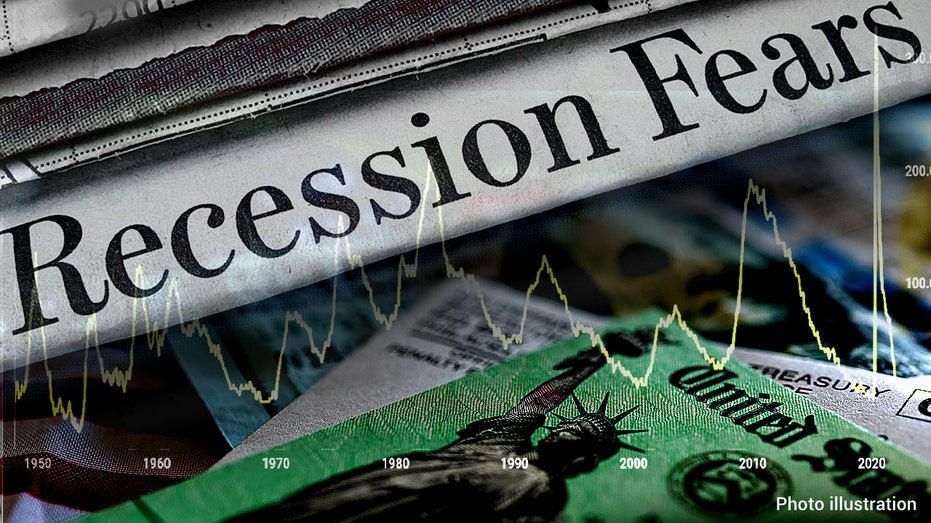What will cause US to go into a deep recession? Harvard economist weighs in
US economic growth drops 0.9% in 2Q indicating a technical recession
Harvard economist on what will cause 'a really deep recession'
Harvard University professor Kenneth Rogoff weighs in on the data that revealed a contraction in the U.S. economy in the second quarter.
Harvard University economics professor Kenneth Rogoff revealed what he believes will cause "a really deep" downturn shortly after data showed that the U.S. is in a technical recession.
Speaking on "Mornings with Maria" Thursday after data revealed a contraction in the U.S. economy in the second quarter, the Harvard economist warned that "the odds of a recession, if we’re not in one, are very, very high."
He then warned that if the Federal Reserve continues to increase rates, "it’s going to be a severe recession or at least a deep one."
On Thursday morning it was revealed that the U.S. economy shrank in the spring for the second consecutive quarter, meeting the criteria for a so-called technical recession as raging inflation and higher interest rates forced consumers and businesses to pull back on spending.
FED RAISES INTEREST RATES BY 75 BASIS POINTS IN ANOTHER HISTORIC MOVE TO TACKLE INFLATION
Gross domestic product, the broadest measure of goods and services produced across the economy, shrank by 0.9% on an annualized basis in the three-month period from April through June, the Commerce Department said in its first reading of the data on Thursday. Refinitiv economists expected the report to show the economy had expanded by 0.5%.
Economic output already fell over the first three months of the year, with GDP tumbling 1.6%, the worst performance since the spring of 2020, when the economy was still deep in the throes of the COVID-induced recession.

Gross domestic product shrank by 0.9% on an annualized basis in the three-month period from April through June, the Commerce Department said in its first reading of the data on Thursday. (iStock / iStock)
Recessions are technically defined by two consecutive quarters of negative economic growth and are characterized by high unemployment, low or negative GDP growth, falling income and slowing retail sales, according to the National Bureau of Economic Research (NBER), which tracks downturns.
US ECONOMY ENTERS TECHNICAL RECESSION AFTER GROWTH TUMBLES 0.9% IN THE SECOND QUARTER
With back-to-back declines in growth, the economy meets the technical criteria for a recession, which requires a "significant decline in economic activity that is spread across the economy and that lasts more than a few months." Still, the NBER — the semi-official arbiter — may not confirm it immediately as it typically waits up to a year to call it.
The NBER has also stressed that it relies on more data than GDP in determining whether there's a recession, such as unemployment and consumer spending, which remained strong in the first six months of the year. It also takes into consideration the depth of any decline in economic activity.
The data released on Thursday could complicate the Federal Reserve's policy trajectory as it weighs how quickly to raise interest rates in order to tame inflation without crushing economic growth.
Rogoff warned that the risks of a deeper contraction are "way to the downside."
US enters technical recession as economy shrank 0.9% in Q2
The U.S. enters a recession following two quarters of negative GDP growth. FOX Business' Edward Lawrence with more.
"The whole world actually is tipping into a recession," he said, noting that "Europe is in worse shape than we are" and that "China’s growth numbers are being marked down again and again," which he pointed out impacts the U.S.
"And when the Fed tightens, it operates with a lag," Rogoff continued. "The interest rate effect takes time to kick in and here we’re already seeing investments slowing down before the interest rate effects are fully kicking in."
He then argued that "we have a ways to go to the downside."
IS THE UNITED STATES ENTERING A RECESSION?
The Federal Reserve on Wednesday raised its benchmark interest rate by 75 basis points for the second straight month as it tries to curb inflation, a move that threatens to slow U.S. economic growth and exacerbate financial pressure on Americans.
The move puts the key benchmark federal funds rate at a range of 2.25% to 2.50%, the highest since the pandemic began two years ago. It marks the fourth consecutive rate increase this year.
"We are seeing supply shocks," Rogoff noted, pointing to the war in Ukraine’s impact on commodities, including energy, as well as China’s "zero-COVID" strategy.
"It puts downward pressure on output [and] upward pressure on prices," he noted.
Recession fears mount as Fed hikes interest rates again
'Kennedy' panelists discuss the Fed raising interest rates again to combat inflation and the likelihood of a recession.
Rogoff added that the situation is "going to put the Fed in a tough spot because, I think, they are going to raise interest rates."
"Say they do go to 3.5%, and they’re going to see inflation still looking pretty high and I suspect they’re going to stop short at that point and tell us, ‘Well, we need to be patient a couple more years' — but if they don’t, I think we will get a really deep recession."
CLICK HERE TO READ MORE ON FOX BUSINESS
Policymakers signaled in their post-meeting statement that additional increases are likely in the coming months as they remain "strongly committed to returning inflation to its 2% objective."
Chairman Jerome Powell said during his post-meeting press conference that another 75-basis point hike could be appropriate in the future, but that it ultimately hinges on upcoming economic data.
FOX Business’ Megan Henney contributed to this report.























